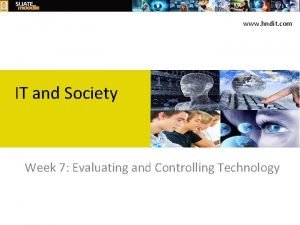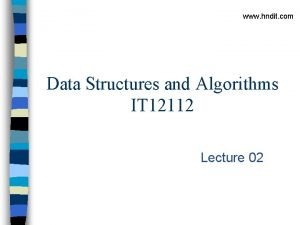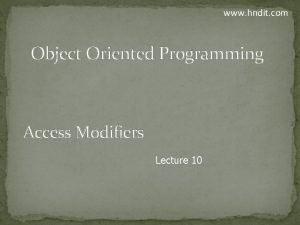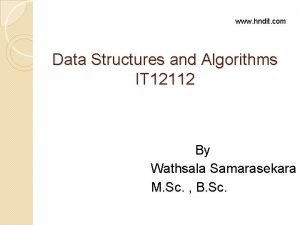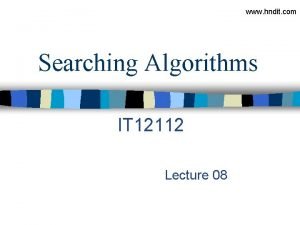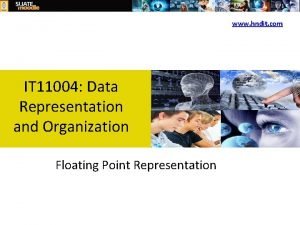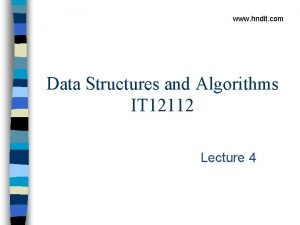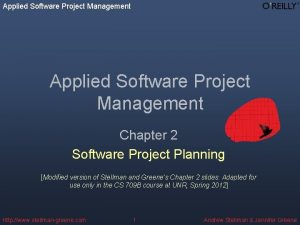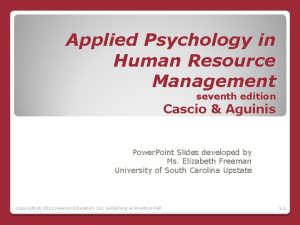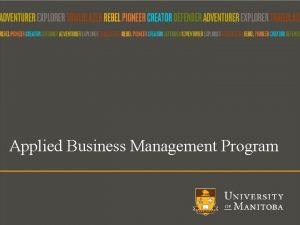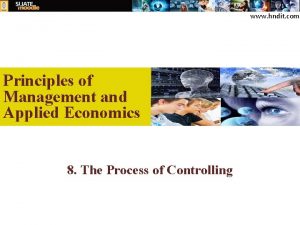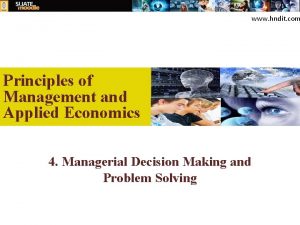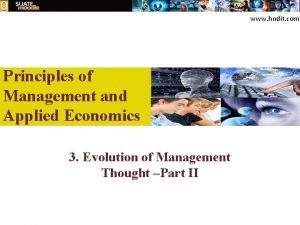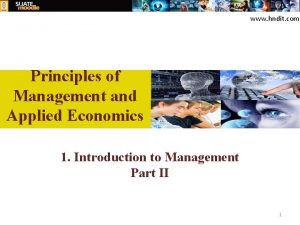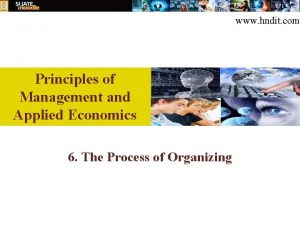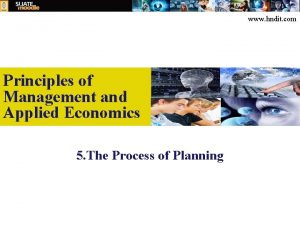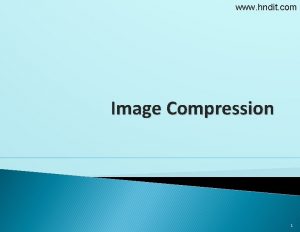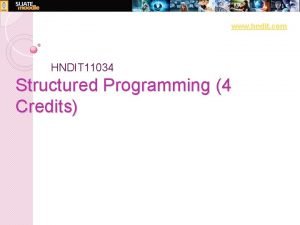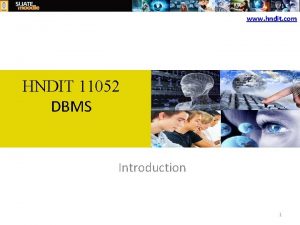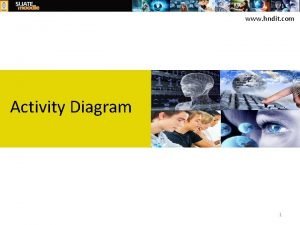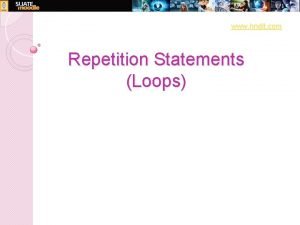www hndit com Principles of Management and Applied






















- Slides: 22

www. hndit. com Principles of Management and Applied Economics 1. Introduction to Management 1

Contents § § § § www. hndit. com What is management? Management as a process Management is an Art or a Science? Core concepts of management Why management? Who is a Manager? Managerial roles 2

www. hndit. com Management in Business Organisations Business Organisation Management 3

www. hndit. com What is Management? There is no universally accepted definition of Management.

www. hndit. com Different Definitions of Management 5

Management Definitions www. hndit. com • Definition – 1 • Management is the art of getting things done through • other people. • Mary Parker Follet (1868 -1933) • Definition – 2 • Management is the art of getting things done through and with people in formally organized group. • (Koontz) • 6

Management Definitions www. hndit. com • Definition – 3 • Management is the process of planning, organising, commanding, coordinating and controlling. • (Fayol, 1930) • Definition – 4 • Management is the process of planning, organising, leading and controlling, the efforts of organisation members and of using all other organisational resources to achieve organisational goals. • (Stoner and Freeman, 2009) 7

Management Definitions www. hndit. com Definition – 5 Management is the attainment of organisational goals in an effective and efficient manner through planning, organising, leading and controlling organisational resources. (Daft, 2012) 8

www. hndit. com • Hence, Management can be broadly defined as a process of planning, organising, leading and controlling the limited resources efficiently and effectively to achieve predetermined goals and objectives in an ever changing business environment. 9

www. hndit. com Management in Organisations Environment Planning Organizing Inputs from the environment • Human resources • Financial resources • Physical resources • Information resources Goals Attained • Efficiently • Effectively Controlling Leading (Source: Adapted from Van Fleet, David D. , Contemporary Management, Second Edition. ) 10

www. hndit. com Core Concepts of Management § § § § Resources Efficiency Effectiveness Productivity Process Goals/Objectives Environment ( Core Concept is a notion or an idea, and in this context it refers to the key terms used to define and understand what management is? ) 11

www. hndit. com Resources An organisation’s resources include; § Human Resources § Financial Resources § Physical Resources § Information Resources § Time § Etc. 12

www. hndit. com Efficiency “Doing things right” (Drucker, 2010) The ability to minimize the use of resources in achieving organisational objectives. (Stoner and Freeman, 2009) Getting the most output from the least amount of inputs. (Robbins and Coulter, 2012) A measure of how well or how productively resources are used to achieve a goal. (Jones and George, 2009) 13

Effectiveness www. hndit. com “Doing the right thing” (Drucker, 2010) The ability to determine appropriate objectives. (Stoner, Freeman and Gibert, 2008) A measure of the appropriateness of the goals an organisation is pursuing and of the degree to which the organisation achieves those goals. (Jones and George, 2009) 14

www. hndit. com Efficiency and Effectiveness in Management (Robbins and Coulter, 2012) 15

High Performing Organisationswww. hndit. com are Effective and Efficient (John R. Schermerhorn) 16

www. hndit. com Productivity is the relationship between the output generated by a production or service system and the input provided to create this output. Productivity = Efficiency + Effectiveness

www. hndit. com Management – as a Process Planning Controlling Organizing Leading 18

www. hndit. com Four Functions of Management (Jones and George, 2008) 19

www. hndit. com Management Is it a Science or an Art? 20

§ Management as a Science www. hndit. com Science is a body of knowledge pertaining to a specific field of study. It contains theories, principles and facts. § Management as an Art implies the application of knowledge and skills to bring about the desired results. Management is both a science as well as an art. Science(theory) and art (practice) are both essential for the success of management. 21

www. hndit. com Why Management? § To maximise the utilisation of scarce resources § To face the increasing competition for inputs and outputs § To enhance the quality of the products and services § To adopt/plan for the changes in the business environment The ultimate aim of management is to enhance the organisational productivity and performance.
 Bài thơ mẹ đi làm từ sáng sớm
Bài thơ mẹ đi làm từ sáng sớm Cơm
Cơm Hndit syllabus
Hndit syllabus Hndit syllabus
Hndit syllabus Hndir.com
Hndir.com Hndit.com
Hndit.com Hndit
Hndit Advantage of data structure
Advantage of data structure Hndit
Hndit Hndit
Hndit Hndit
Hndit Hndit application 2020
Hndit application 2020 Hndit
Hndit Rhythm stone
Rhythm stone Principles of applied engineering
Principles of applied engineering Applied principles of horticultural science
Applied principles of horticultural science Applied software project management
Applied software project management Applied software project management
Applied software project management Applied psychology in human resource management
Applied psychology in human resource management Applied software project management pdf
Applied software project management pdf Applied psychology in human resource management
Applied psychology in human resource management Applied psychology in human resource management
Applied psychology in human resource management Applied business analysis university of manitoba
Applied business analysis university of manitoba




